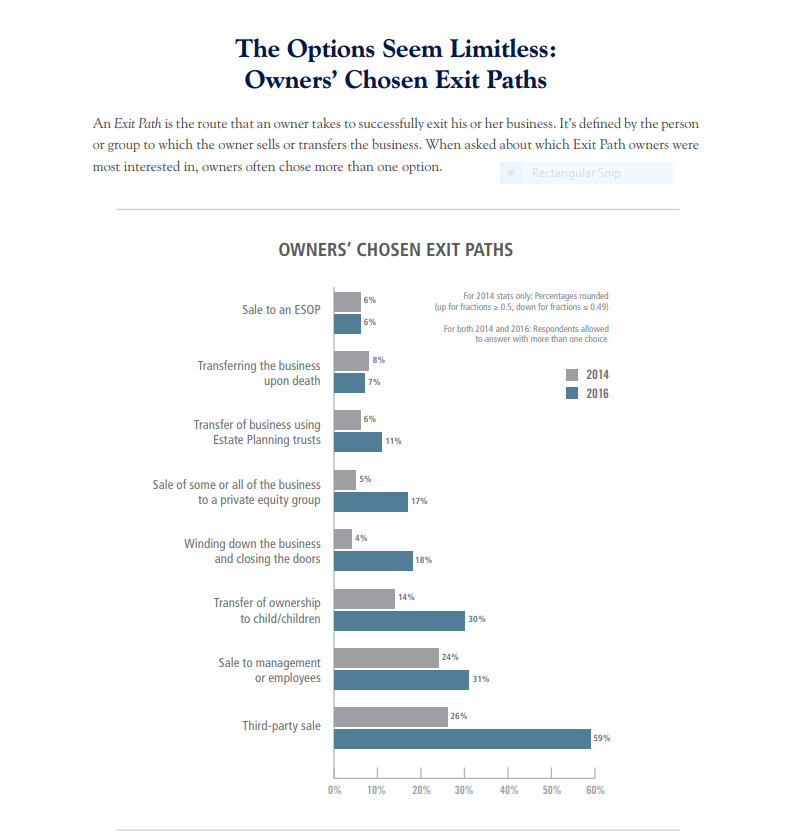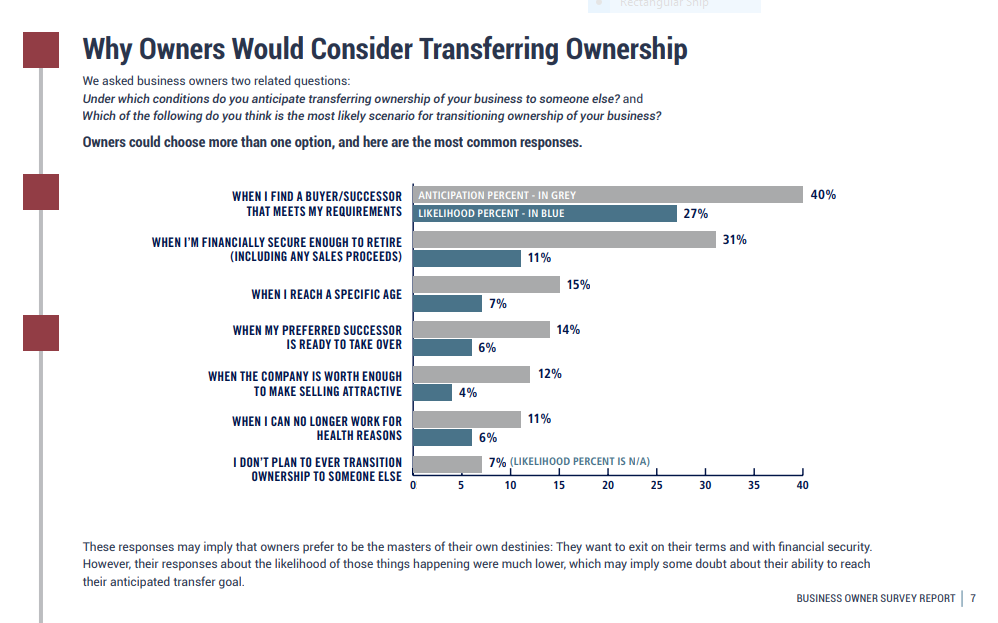Part
01
of one
Part
01
Business Owner Research
We have curated nine pieces of information, data, and/or statistics surrounding the primary reasons that owners exit (sell) their business, and we have also provided nine pieces of information, data, and/or statistics surrounding the ways, and why, small business owners should be planning their exit strategy from the moment they purchase a business. All research is United States focused, and surrounds small businesses.
Small Businesses: Reasons Owners Exit/Sell
- The BEI 2016 Business Owner Survey reveals that one of the most common exit paths used by business owners is transferring the company to key employees or management. Thirty-one percent of business owners in that report specified that they were interested in pursuing a transfer to key employees or management. This exit strategy was only outdone by a third party sale which represented 59% of responses. It should be noted that the participants in the survey were allowed to choose more than one exit path.
- Key findings from this four year old report found that most business owners want to exit their businesses within the next decade (79%), and most business owners have not created a concrete, written plan for their exits (83%). For the 2019 report, this dropped to 56% of business owners that want to sell or transfer their ownership within the next ten years, and slightly dropped to 79% of business owners that do not have a written plan for the future of their business ownership. In a startling difference, while 75% of small business owners reported back in 2016 that they would sell their business if their financial security were assured, the 2019 results revealed that just over 58% of business owners would sell if their financial security were guaranteed, which is a substantial drop.
- Moving more fully to the 2019 Business Owner Survey Report, some interesting findings can be observed surrounding the reason why owners would consider exiting their business. The participants in the study were asked two closely related questions. One: Under which conditions do you anticipate transferring ownership of your business to someone else?...and... Two: Which of the following do you think is the most likely scenario for transitioning ownership of your business? While fully shown in the graphic below, the three primary reasons for both questions appears to be when they find a buyer and/or successor that meets their requirements (40%/27%), when they are financially secure enough to retire, which would include any sales proceeds (31%/11%), and when they reach a specific age (15%/7%). When the business owner could no longer work for health reasons came in at 11%/6%.
- According to this source, there are six reasons that business owners exit. These reasons are the company is IPO ready, there is market uncertainty, the business is failing, the owner is bored with the routine, the owner is exhausted, and a lifestyle change is desired. As an interesting observation to bolster the exhaustion reason, there is a study that was conducted by Dr Michael Freeman, a clinical professor of psychiatry at the University of California. As an entrepreneur himself, he found that 49% of entrepreneurs have mental health problems. At 30%, the most often reported of these is depression followed by anxiety at 27%. Both of those illnesses have stress as a major contributory factor, and some entrepreneurs choose to exit their companies to avoid burning out completely.
- The top 10 reasons that business owners decide to sell, according to this source, are retirement, the company is not making enough money, the owner wishes to relocate, the business owner is burned out, health problems, another business opportunity is presented to the owner, the business is at a high point and is therefore attractive to buyers, problems with their business partners, the death of the owner (which leaves family to sell the business), and a change is desired. These reasons appear to echo the six reasons provided in the previous bullet point. It should also be kept in mind that quite often the sale of a business is prompted by a combination of these reasons such as health issues and retirement, relocation and retirement, burn out and partner problems, and many more combinations.
- There could be strategic or operational reasons that a business owner has for selling. For example, the owner may wish to gain market share, finance an expansion, raise capital for an acquisition, place better management, diversify a narrow customer base, diversify their product and/or service offerings, and secure leadership succession.
- The second most common reason why people decide to sell their businesses, according to Investment Bank, is that business owners are exhausted, drained and “over it”. Only retirement was a bigger factor. Other reasons are physical illness or family problems, shortsightedness (which can include when the bulk of a company’s incomes are dependent on a couple of clients and not recognizing a declining industry trend), strong, increasing competition, because the owner had a committed exit strategy plan and stuck to it, and an opportunity to capitalize presents itself.
- It is rare for a business to continue on through various generations in one family. Only about 30% of family-owned businesses survive the second generation, about 12% survive the third generation, and about 3% survive the fourth generation.
- The 2018 UBS “Who’s the boss?” report reveals that business owners stated that their reason for leaving the business 65% of the time was because it was a good time to sell and they are ready to retire. Almost half (49%) said they are looking to find a work-life balance.
Small Businesses: Planning an Exit Strategy
- Recent surveys of business owners by EPI show that many owners have little to no exit planning in place, even though many of them have 80 to 90 percent of their financial assets based in the business itself.
- "EPI estimates that some 4.5 million firms representing more than $10 trillion in business value will transition over the next decade or so, but Christopher Snider, president and CEO of the Exit Planning Institute (EPI), believes only about 20 percent to 30 percent of businesses that go to market end up selling. This estimate is consistent with BizBuySell’s most recent national report, which indicated about one of every five listings on the online marketplace for small business sales and purchases had closed a sales transaction in 2016."
- According to the 2018 UBS “Who’s the boss?” report, "forty-eight percent of business owners don’t have a formal exit strategy." Most of these business owners expect a competitor to buy their firm, ahead of employees, large companies or private equity firms.
- It might seem counter-intuitive to start thinking about the end of a business when it is first purchased, but it's never too early to plan, according to Sarah Brennan, founder and principal strategist of Accelir. When sitting down with the founder or leadership team of a new business, the first question she asks is, "What is the end goal for you. To grow, stabilize or sell? Even if the exit plan is five to 10 years out, working with the end in mind impacts how you approach everything from product and go-to-market strategy to who you partner with and what clients you target first. Companies can run into obstacles when they haven't thought through what they are working toward when offers to buy come in or, worse, when they haven't built the business in a way to be bought."
- Adam Wilkinson, CEO of Hollywood Mirrors asserts that a business owner "should always have an exit plan in mind, from the moment your business idea is conceived, then, when you start your business, your sole focus and No. 1 question every day should be, how can I maximize the value of my business?"
- For many entrepreneurs the excitement of buying a business can cloud the fact that there will come a time when they will want to exit their business and move onto something else. In fact, very few business owners accept this reality as around 65% of small business owners do not have a plan for selling their business, according to a study conducted by BMO Wealth Management.
- Some of the most common reasons why business owners need to be making exit plans right away are because of unexpected events, investors will want to understand when and how they will be paid back, planning for retirement, and wanting to move or pivot to doing other things in the future.
- Having an effective exit strategy can build confidence for the investors in the business. "Most investors do not get to see the value of their investment until the company is purchased by another entity or until they call in on their investment." Additionally, having a plan for an exit from the company will allow the business owner to feel confident in their decisions when the time comes to sell it or to allow someone else to run the day-to-day operations, which makes the business owner a more effective leader and decision-maker.
- According to a study conducted by Wilmington Trust, common reasons business owners haven’t adopted an exit strategy include the fact that it appears owners enjoy managing their businesses so much, they don’t want to think too much about stepping away from them, owners are simply too busy to engage in this type of business planning, and the potential transition is so far in the future, business owners don’t see it as something that needs to be planned for today.




